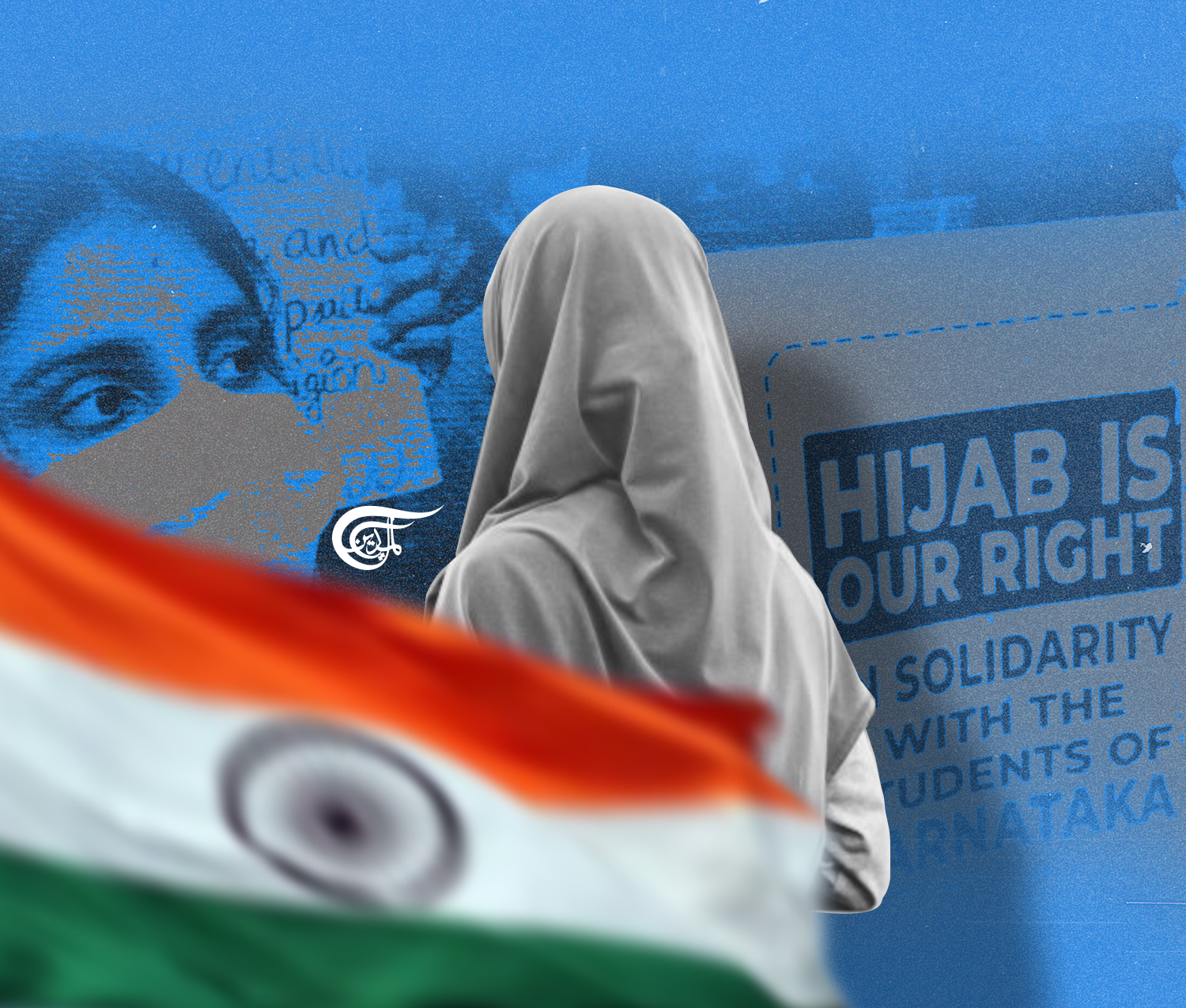Hijab ban, anti-muslim hate in India: Isn’t it apartheid?
While anti-muslim actions committed by extremists in India might look like unilateral acts at first glance, they are encouraged and sponsored By PM Narendra Modi's party.
-

The hijab ban, according to critics, is part of the ruling BJP's bigger objective of "actively abetting and spreading" anti-Muslim bigotry
Islamophobia is a type of racism that refers to acts of violence and discrimination, as well as racist discourse, that is fueled by historical injustices and negative stereotyping and leads to the exclusion and dehumanization of Muslims and those thought to be Muslims. It is a form of racism in the sense that it is the outcome of the social construction of a group as a race and the attribution of specificities and stereotypes to that group, with real or perceived religious membership serving as a proxy for race in this case.
There is a growing public sentiment of anti-Muslim hate across India. It has created a huge problem for Muslims, all over the country. Recently, India banned a hijab worn by students in schools and colleges, not only because they are Muslims, but also for their political views. While this ban was just lifted for two days by Governor, it was later removed again after the Supreme Court declared that wearing the veil over the hair and face of women was unconstitutional.
The Indian Supreme Court in its opinion declared that those who wore the veil have to wear them by Constitutional parameters and under no circumstances infringe upon others' constitutional rights. But India’s government BJP party leaders want to repeal this ban as well as religious symbols, which symbolize Muslim identity. To prove their point of view, the Indian government conducted an online petition on the issue for several days.
Islamophobia incidents in India started in the 14th century when Muslims got expelled from Western courts and imposed in their territories. Then, came Babri Masjid demolition and subsequent communal riots and killings. Many other incidents of violence took place during that time (Talat, 2022).
Since January, when a group of six Muslim students protested outside their school after being denied access due to their headscarves, tensions in Karnataka, an Indian state have been simmering. Due to pressure from Hindutva organizations who have launched an anti-hijab campaign by donning saffron shawls, numerous other colleges in the state began restricting access to hijab-wearing students.
Similarly, at least four more Indian states, West Bengal, Uttar Pradesh, Telangana, and the capital, New Delhi, have reported protests against the ban. Afreen Fatima, a Muslim rights activist and national secretary of the Fraternity Movement, an independent student organization with chapters on campuses around the country stressed, “It's apartheid”. Muslims are subjected to institutional segregation. There have been instances of Muslim students wearing hijab being taught in separate classrooms", Fatima said, referring to a case in which a college in Karnataka allowed hijab-wearing students to be taught in separate classes. Activists have noticed an increase in cases of discrimination and violence against minorities in the region over the last year.
Moreover, activists consider the ban on the hijab in educational institutions as part of the ruling right-wing Bharatiya Janata Party's (BJP) bigger plot to make Muslims "second-class citizens" in India. Over 130 feminist and democratic organizations from 15 Indian states have declared their support for the students. They fully support Muslim women, whether or not they wear hijabs, in their quest to be treated with respect and to have access to the entire range of rights. They further assert that Muslim women students in Karnataka (Indian city) who wear hijabs do so on their initiative and that this initiative must be supported. Girls and women should be able to attend school without being embarrassed or punished because of their clothing. Educational institutions should focus on what is on students' heads rather than what is in them.
The hijab ban, according to critics, is part of the ruling BJP's bigger objective of "actively abetting and spreading" anti-Muslim bigotry. The Islamic faith's symbols and physical manifestations are being targeted. This is intended to further force Muslims out of public spaces, into ghettos, and deny them and reject their rights. Since taking office in 2019, the regional government has issued decrees tightening the state's cattle slaughter regulations and launched a contentious measure that would make it more difficult for interfaith couples to marry and convert to Islam or Christianity.
Former Amnesty International India director Aakar Patel believes the Indian government is "legitimizing, inciting, and devolving" violence against Muslims in the country. India's 200 million Muslim minorities believe the hijab ban infringes on their religious freedom, which is guaranteed by the Indian constitution.
Most significantly, unprovoked attacks on Muslims by Hindu mobs have become common in India, but they appear to draw little government outrage. Previously, a video went viral on social media showing a terrified young child clutching to her Muslim father as he was assaulted by a Hindu crowd. The police eventually rescued the man and his daughter.
Similarly, another viral video emerged showing a Muslim bangle vendor in India being slapped, kicked, and beaten by a Hindu crowd. The attackers were heard verbally insulting her and warning him to avoid Hindu regions in the future. In March, a 14-year-old Muslim kid was viciously attacked after entering a Hindu temple to get water. In June, a vendor in Delhi (capital city) was attacked for attempting to sell fruit in a Hindu neighbourhood.
Recently, the current drive of Muslim girls to wear hijab in Indian schools took a new turn on as a video went viral on social media showing a Muslim girl wearing hijab being harassed by dozens of young males outside a college. The young Muslim girl was on her way to college in India when she was confronted by students from the Hindu-Right wing.
Notably, the religious divisions have persisted in India for a long period of time, but anti-Muslim violence has increased significantly since 2014 under Prime Minister Narendra Modi's Hindu nationalist regime. Although communal violence is not a new phenomenon. The distrust was always present, but religious nationalism and ethno-nationalism have exacerbated cleavages, it has grown in perfect sync with those in power and political activity. Prime Minister Modi does not condone such acts, but he was slammed for failing to condemn them swiftly or firmly enough.
Additionally, in December, India's far-right Prime Minister Narendra Modi linked Muslim figures from India's ancient history to contemporary "terrorism and religious extremism" in public speeches, suggesting that India's Muslims should indeed be held accountable and punished for alleged crimes committed by their "ancestors".
The Organization of Islamic Cooperation (OIC) has expressed grave worry over the ongoing attacks on Muslims in India and has urged the international community, particularly the United Nations, to take action to prevent hate crimes against the minority population. The OIC General Secretariat further stressed India to safeguard the Muslim community's safety, security, and well-being while also protecting its members' way of life and bringing the perpetrators of acts of violence and hate crimes against them to justice.

 Ruqiya Anwar
Ruqiya Anwar
 7 Min Read
7 Min Read











